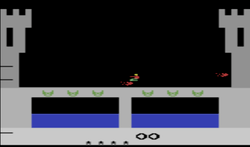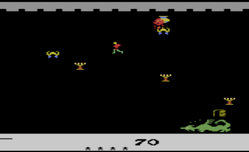Dragonfire (video game)
| Dragonfire | |
|---|---|
 Atari 2600 cover art of Dragonfire | |
| Developer(s) | Imagic |
| Publisher(s) | Imagic |
| Designer(s) | Bob Smith [1] |
| Platform(s) |
Atari 2600 (original) ColecoVision, Commodore 64, VIC-20, Intellivision, TRS-80 Color Computer, Apple II |
| Release |
May 21, 1982: 2600 1982: Intellivision 1983: VIC, Spectrum 1984: Apple, C64, CV, CoCo |
| Genre(s) | Action |
| Mode(s) | Single or Two-player |
Dragonfire is a 1982 video game written by Bob Smith and published by Imagic.[1] The player grabs treasure guarded by a dragon while avoiding fireballs. It was originally released for the Atari 2600 then ported to the Intellivision, VIC-20, Commodore 64, Apple II, ZX Spectrum, ColecoVision, and Tandy Color Computer.
The game's source code was made available as public domain software by developer Bob Smith on May 24, 2003.[2]
Gameplay


Each level of Dragonfire consists of two stages. The first stage is a side view of the character trying to cross a drawbridge to reach a castle. To traverse the bridge, the player must duck under high fireballs and jump over low fireballs (or perform the improbable-looking kneeling jump). Upon success, the second stage begins, which has a more top-down point of view and wherein the player must guide the character around the room collecting treasure and dodging more fireballs spewed by a dragon that patrols the bottom of the screen. Every piece of treasure in the room must be collected in order for a door to appear, which takes the player to the next level. A single hit from a fireball in either stage will deplete one of the player's seven initial lives. Gameplay in each level is identical, except that the character and fireballs get progressively faster.
Reception
Electronic Games in 1983 described Dragonfire as "especially useful as an introduction to fantasy gaming for younger players — while still having enough thrills to please the rest".[3] The game would go on to receive a Certificate of Merit in the category of "1984 Best Videogame Audio-Visual Effects (Less than 16K ROM)" at the 5th annual Arkie Awards.[4]:42
References
- 1 2 Hague, James. "The Giant List of Classic Game Programmers".
- ↑ Dragonfire_source
- ↑ "The Players Guide to Fantasy Games". Electronic Games. June 1983. p. 47. Retrieved 6 January 2015.
- ↑ Kunkel, Bill; Katz, Arnie (January 1984). "Arcade Alley: The Arcade Awards, Part 1". Video. Reese Communications. 7 (10): 40–42. ISSN 0147-8907.
External links
- Dragonfire for the Atari 2600 at Atari Mania
- The Atari 2600 version of Dragonfire can be played for free in the browser at the Internet Archive
- 1983 Dragonfire TV commercial